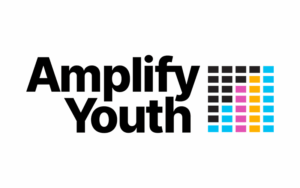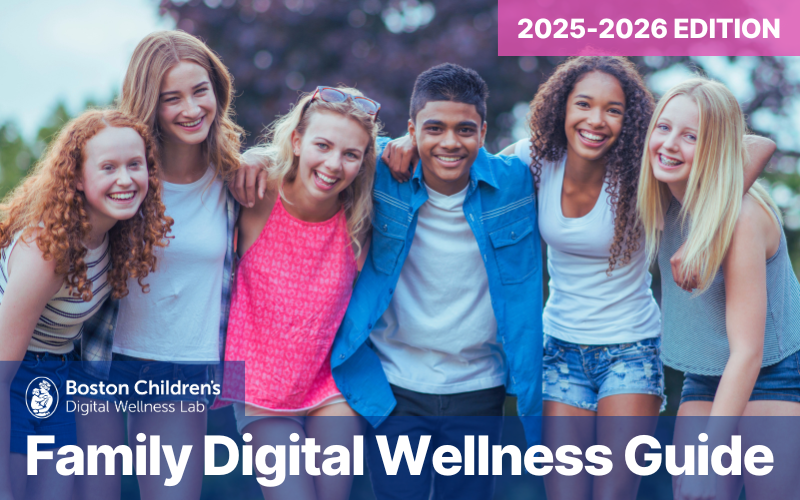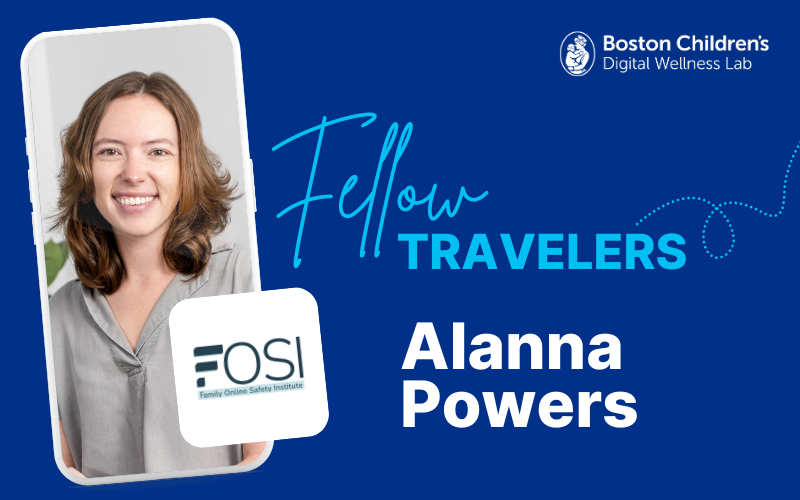Alanna Powers
Research and Program Specialist, Family Online Safety Institute (FOSI)
What’s your organization’s mission and your personal area of focus?
From the highest level, the Family Online Safety Institute (FOSI) focuses on making the online world safer for kids and families. A big way we do this is as conveners in the online safety space. We bring together people from all over: industry, government, educators, other nonprofits, and beyond, to talk about the most pressing online safety issues and their solutions. We break this work mainly down into three P’s: Policy, Parenting and Practice.
- Our Policy team focuses on educating lawmakers and regulators.
- Our Parenting pillar is a platform called Good Digital Parenting where we try to give caregivers the information they need to raise confident digital citizens. As a program specialist, I collaborate with authors from outside organizations who can offer their unique perspectives on digital parenting. I also create resources and guides that help parents navigate their family’s digital lives.
- We host events, both big and small, under our Practice pillar, with the purpose of highlighting all areas of our online safety work.
Another big part of my job is to lead our research. This year, it includes working with a research firm on a large three country research project about well-being in the digital age. The findings from this project will be released at our annual conference at the beginning of December, which we’re super excited about. I’m also in the process of creating a new research project. It’ll be a smaller, biannual survey about online safety, and we do hope to release the first survey results for that this year.
What led you to the work you do today?
To start, I’m really a true “Cusper”. I was born in the late nineties, so I understand the perspective of both millennials and Gen Z, and I think this puts my peers and me in a really interesting position growing up. For example, I remember dial-up, but by the time I graduated high school we had laptops in our classrooms. I also grew up alongside the major social media platforms because they became widely popular right around the time I turned 13, which, as we know, is the age kids usually start to use them. Growing up alongside the technology landscape as we know it today has made it really interesting to me, and it’s also given me a really unique perspective on how we should be working with families and children going forward.
Right after I graduated college, I did a Fulbright teaching assistantship in the Czech Republic, where I was based in a really tiny town, but teaching at a big technical high school where I learned more about the benefits and the drawbacks of technology for today’s teens. During that time I became especially interested in media literacy, so when I got back from my Fulbright, I went on to get a Master’s in Media Studies at the Newhouse School in Syracuse. My thesis focused on young people’s perceptions of media literacy education and involved talking to a lot of young people about their tech use inside and outside of the home, which was very eye opening. During my thesis research, I actually came across FOSI. Right around the time I was set to graduate, a job opened up here which, knowing now how small we are and how little turnover there is, I’ve come to view as quite serendipitous.
What have you learned in the course of doing this work?
I feel like tech and children’s wellness is the hot topic of 2024, so in general we’re starting to see a lot more research dedicated to wellbeing in the digital age, which continues to show the both positives and negatives effects of tech on kids’ wellbeing. This is really interesting to me as there can be a general assumption that tech equals worse wellbeing, and although that can be the case with some things (e.g., endless scrolling, black box algorithms), I think there’s also a lot of ways that tech enhances wellbeing. For example, when I was pondering this question, I was thinking about my All Trails app in that it has enhanced my wellbeing, getting me outside and safe while I’m hiking.
One major thing I’ve learned is that kids’ relationship to tech may not be as dire as I sometimes think it is. Of course, there are some major problems that need to be addressed, and I don’t want to ignore that fact when it comes to online safety, but I think the digital world can also be a really amazing place for kids. Especially kids who come from marginalized backgrounds who may not have the support that they need in real life. In those cases, the internet can create really safe spaces for the kids who need them.
What guidance or advice do you have for parents and caregivers to help children build and maintain their wellness when engaging with technology and digital media?
I want to preface this by saying that I’m not a parent myself and it is the hardest job in the world! I know also that a lot of our advice as online safety professionals can be easier said than done. With that in mind, because our real lives and our digital lives are quite intertwined, recontextualizing digital parenting into more of a subset of traditional parenting can be really helpful for kids, and also less overwhelming for parents. For example: if you want to talk to your child about bullying in school, make sure you also talk about cyberbullying in the same conversation.
Another thing we talk about a lot at FOSI is that it’s really imperative to have frequent conversations with your kids about their tech use. Definitely make an effort to understand what they are using their devices for and why. I also like to encourage kids to go one step further and have their parents participate in digital activities with them. For example, if you find out that your child really likes a certain video game, ask to play with them. It can be a really fun bonding experience and you’ll be familiar with the game. If down the line your child needs help or is feeling unsafe in any certain situation, you’ll know how to navigate the game, which I think can be really great as well.
Lastly, something I always like to say is parents know their child best. So of course, follow the ratings, the parental controls, and the general guidance of the apps and the platforms when it comes to age appropriate content and online experiences. However, if you, as their parent, know your child isn’t ready for a certain online experience, feel free to have them hold off for a while. For example, if they’re 13 and they want a social media account, but you as the parent don’t think they’re ready, trust that judgment. All kids grow and mature at different times, so do what is best for you and your family.
How would you change or design technology and or media to be healthier for kids across the developmental span?
I would love to see more tech that encourages kids to get outside. The first thing that comes to my mind is the glory days of Pokemon Go in summer 2016. The app really got people outside and bonding with one another — my brother and I had a lot of fun playing when we were both home from college that summer. Also, I would like to see more tech that has that sort of analog aspect to it as well. I think socialization and movement are really important for both our physical and mental health, so we should design more technology that really recognizes this.
Anything else you’d like to share?
Did I mention that FOSI is a proud advisor to the Inspired Internet Pledge? We’re excited to see so many companies and nonprofit organizations coming together in support of making the internet a safer place.
For all who are interested, please join us at FOSI’s Annual Conference on December 9, 2024 in Washington, DC. There we will dive into a lot of questions just like this and a lot more, so would love to have everybody who wants to make the trip join.
Finally, here are some other helpful links from FOSI:
- 7 Steps to Good Digital Parenting
- Safety Cards For Your Devices
- Family Online Safety Agreements
- Digital Reputation Checklist
- GenAI Conversation Starters
We know that no one person, organization, or company can successfully address the challenge alone, so it’s imperative that we collaborate to design and maintain a healthier digital experience for all young people and their families. Our Fellow Travelers blog series features colleagues from around the world who focus on digital wellness from a different perspective than the Digital Wellness Lab, enabling us to share expertise in key areas of digital wellness that we don’t explore as deeply.
Here at the Lab, we welcome different viewpoints and perspectives. However, the opinions and ideas expressed here do not necessarily represent the views, research, or recommendations of the Digital Wellness Lab, Boston Children’s Hospital, or affiliates.








